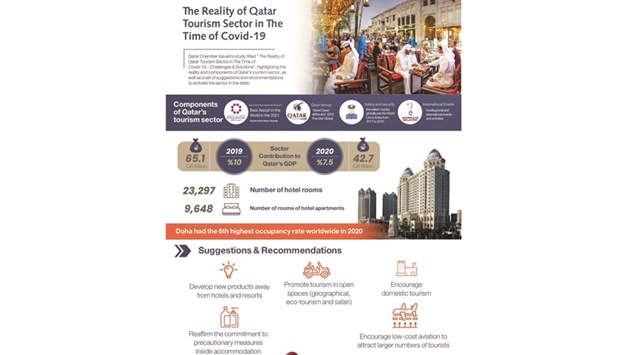Qatar Chamber is calling for the development of an action plan to mitigate and reduce the impact of the Covid-19 pandemic on the country’s tourism sector in a recently issued report on ‘The Reality of Qatar Tourism Sector in the Time of Covid-19 (Challenges & Solutions)’.
According to Qatar Chamber Research & Studies Department, which prepared the report, the impact of Covid-19 on Qatar’s tourism sector was reflected in the number of hotels and hotel rooms established during the pandemic.
The report stated that in 2020, there was no change in the number of hotels in Qatar, which totalled 109. Also, the number of hotel rooms stood at only 23,297 by the end of 2020, a 5.2% decrease compared to 24,562 keys recorded in 2019.
According to the World Travel and Tourism Council, the contribution of the travel and tourism sector to Qatar’s GDP decreased by 7.5% in 2020, or QR42.7bn. The sector only contributed over 210,300 jobs, which is 10.2% of the country’s total employment in 2020, registering a 19.8% decrease.
However, despite the negative impacts of the pandemic, Qatar’s hospitality sector “fared exceptionally well” compared to global benchmarks, according to the report. It stated that Doha had the sixth-highest occupancy rate worldwide in 2020, and the smallest decline in RevPAR among all key global cities.
In 2020, international tourists in Qatar spent over QR32.1bn compared to QR47.8bn in 2019, a decrease of 32.8%. Domestic travel and tourism spending by residents in Qatar stood at QR6.9bn in 2020 compared to QR11.6bn in 2019 or a 40.5% decrease.
The study said the chamber, as a private sector representative and through its Tourism Committee, plays an important and active role in stimulating domestic tourism by encouraging the private sector to make a greater effort to support and develop the sector amid recent challenges. It also encourages the private sector to establish tourism-related projects and hotel accommodation facilities in various ratings to make the 2022 FIFA World Cup “a great success.”
The chamber further works through its committee to find solutions to obstacles facing the sector, especially in view of the repercussions of the Covid-19 pandemic, and by promoting investment opportunities in the sector through the chamber's website or through the chamber’s magazine, among others.
The study reviewed some of the obstacles besetting the sector, such as the lack of infrastructure, as the sector still requires many hotels and hotel rooms to meet the increasing demand from the large number of tourist delegations. It also pointed to the lack of tourist resorts in the country and the underutilisation of the country’s 600km coastline.
Other obstacles also include the lack of training, skills, technical capabilities, and sufficient qualified human resources, in addition to ineffective marketing and advertising networks to promote tourism products, and the lack of studies and research related to the tourism sector.
Similarly, other issues include complicated and long procedures for cruise ships visiting the country, leading to delays in tourist delegations; the absence of tourist guides approved by official tourism authorities; high prices of hotel accommodation in many resorts due to the health requirements related to the pandemic; and expensive flights and services rates in some hotels, which negatively affect domestic tourism.
The study recommended the development of a short-term action plan, which includes two joint phases: reducing the impact of Covid-19 and relaunching tourism activities after easing travel restrictions and social distancing; and preparing a comprehensive plan to revive the tourism sector.
The joint phases were based on the EU and Singapore experiment, which aims to enhance and encourage cooperation between stakeholders in the country’s tourism sector. The study also recommended promoting tourism in open spaces, such as geographical tourism, eco-tourism, safari tourism, rural tourism, and adventure tourism, as well as encouraging domestic tourism and low-cost aviation to attract larger numbers of tourists.
The study also offered several suggestions including creating new tourism products away from hotels and resorts, with the aim of developing and providing an integrated tourism system that supports domestic tourism and attracts foreign visitors.
It also suggested the development of statistics and indicators related to the tourism sector and exchanging data and statistical information between the concerned authorities in the country.

